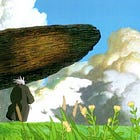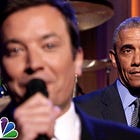My Favorite Pieces I wrote in 2024
From Australia to free speech to the male gaze to America
If I have to describe 2024, it’s possibly peak content. More pieces, more outlets, and hopefully a larger audience. If you are new to my writings or newsletter, I would like to share with you my favorite pieces I wrote this year, ranging from art to politics. It’s a cliché that good writing is hard to come by, and conducting research to make up for that quality is almost as difficult. I hope these essays and reviews will leave this impression:
Hayao Miyazaki's War
One of my first write ups of 2024, written in the midst of The Boy and The Heron’s release, explored Hayao’s complex feelings with war and conflict. On the one hand, he hates its destruction. On the other hand, he loves those Italian fighters. These ideas not only shaped the animator, but the medium of anime itself, which approaches violence in such an intense manner.
Australia Day: A Contentious Celebration ($)
This has been on the backburner for a while, but I’m happy that it’s now published. Australia Day remains an important day for its country and its people. That it remains divisive and all the arguments to change the date, means that the longevity of the essay is intact.
Love Lies Bleeding and the Limits of the Inclusive Gaze ($)
Another concept that grinds my gears? The inclusive gaze. With films like The Substance and Love Lies Bleeding, the question of whether that can inevitably turn into the old-fashioned male gaze, will continue. But my take is that it rewards and embraces exclusivity, and Love Lies Bleeding can’t rely on it to compensate for its limited storytelling and character drama.
Buddy Duress Was The Most Brilliant Actor You've Never Heard of ($)
One of the all-time biggest scene stealers, sufficient enough to warrant an obituary to someone who could have made it big in acting and nothing else. We all know someone who was like that.
For We Are Young And Unfree
A screed I wrote in The Critic arguing that, in the wake of Elon Musk’s fight with the eSafety Commission, Australia is innately inclined not to care about freedom of speech and how its elites still uphold hate speech, because the public sure do enjoy being conformists. Between the proposed misinformation bill (which has been slapped down) and teenagers not being able to access social media (which passed), I fear that our relationship with freedom will be as confounding as the rest of the world finds it to be.
The Matrix “25 Years” Later and Fight Club 25 Years Later ($)
The Matrix is not just a film about transformation. It is transformation, and it has turned popular culture into a cyclical feedback loop, with right-wingers proclaiming their redpilled, while left-wingers (with the Wachowskis as their mascots) claim it is about taking advantage of their own bodies. Similarly Fight Club has an issue with media literacy, but can you really blame those who couldn’t get it, when they share the emotions of its deluded protagonist. As I wrote:
This is what a lot of fans interested in analyzing “The Matrix” miss. By dressing their film up as a story about a marginalized minority, the Wachowskis presume that only they have control of their art; that the culture surrounding it should not shape it into something they don’t want. As modern film culture becomes nothing more than permission-seeking, it values virtue over truth and moralizing over pathos.
Obamacore was Cringe
An assessment of the Obama era pop culture and the reason why people look back at it with cringe, is because the President’s ideals of equality and fairness had lost to a strongman. I wrote this before the election, and rereading it, it still holds up. My prediction that the losers will be in despair, immediately after Donald Trump won re-election, has already been confirmed, but the impact will depend on whether these artists truly want to be creative and transcendent, rather than virtue signalling about how much they hate their political opponents.
America Will Be Fine
A piece I wrote while I was travelling in the US, observing the tumultuous election cycle. It has been a consistent theme for my writing, considering that the bleak mood in the US, which dominates and influences our culture, is seen as a form of sloppy entertainment by the likes of Ian Miles Cheong and Aimee Terese. I argue, however, that the country, with its robust economic growth and its historical resilience, will not collapse under the incoming Trump administration.
Why The Apprentice Still Holds Up ($)
A review that I wrote after travelling in the US, in which I make the case that it’s accidentally a pro-Trump film. Following the election, The Apprentice is certainly the Donald Trump biopic America deserves.
Civil War and the Ideals of Apolitical Art
As someone who is very interested in art and its relationship with politics, it often frustrates me how so many writers desperately attempt to find political meaning in pop culture, and dismiss any artists who want to stay away from politics. The discourse surrounding Alex Garland’s Civil War was so boiled, that it basically demonstrates how no one, not even its champions, can actually tackle its aim to be the least political movie. Being apolitical, I argue, is political, but it doesn’t mean it has to be complacent. And it’s a challenge that Alex Garland, nobly, wants to take.





